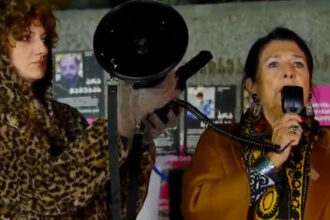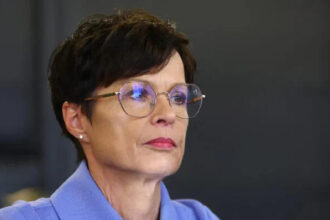Secretary General Jens Stoltenberg announced the selection of the Senior Representative for the NATO Representation in Ukraine on 17 July. Patrick Turner will assume the role in Kyiv by September. His previous experience includes roles as NATO’s Assistant Secretary General Operations, Assistant Secretary General for Defense Policy and Planning and various high-ranking civil servant positions in the United Kingdom. Radio Free Europe/RL’s Georgian Service interviewed him two days before the Sec Gen’s announcement.
Recent events have cast a large shadow over the NATO summit in Washington DC. What is the impact on the rest of NATO? How much depends on the outcome of this conflict for Ukraine?
I would say that it is true that the American debate or crisis, as you may call it, was a tactical distraction during the summit. However, it did not affect the actual outcome of the summit. Europe, along with the rest of world, is eagerly awaiting the results of the November elections.
Recent NATO polling shows strong support across the alliance. In the US and across the political divide, there is still strong support for NATO on both sides of political aisle in Congress. I am confident and I’ve heard that Jens Stoltenberg is confident that NATO will have good support, regardless of the outcome of US elections. He said that during the first Trump administration, the focus was on the defense budget. And President Trump said – and I think he was right – that it’s not reasonable to expect American tax payers to care more than European tax payers about defending Europe. If there are many allies who do not meet their commitments, that is unacceptable. It was, in fact, unacceptable. Now, 23 out of 32 allies have already reached 2% and the rest have plans to reach 2%. We’re still not where we should be in every respect, but we’re much closer. I can imagine that the demand would be even higher if a Democrat or Republican administration were to take office next time.
Even if the standards are met, Georgian membership in NATO will be a challenge
I won’t make any predictions about how things will look in Ukraine next year. But, my experience has shown that many of the things that are said during a campaign don’t translate into policy or facts. Let’s wait and watch. So far, the support for Ukraine has been remarkably unified and stronger than Putin could have ever imagined. I expect that to continue.
What would it mean if former President Trump returned to the presidency and “ended the war in 24 hour”?
I can’t speculate for someone else about what this might mean in the real world. I can imagine some of this rhetoric continuing in the coming months. It is now as clear as possible that Russia does not want to negotiate. This week, during the summit, they made it clear that their strategic intention is to dismember Ukraine and for Ukraine to cease to exist as a separate nation. They were saying, as clearly as possible, “if you dream of negotiating then it is not a dream we share.” On the Ukrainian side, friends have said “we are not going to engage in discussions about losing Ukrainian land or censuring Ukrainian territory.”
I don’t like to use hypotheticals but I would be open to this kind of negotiation if it meant making it clearer than ever that there is only one path to victory for Russia, and that other means will be used in order to achieve that. I’m not certain that this is the intention. More pressure on Russia and more clarity about the fact that they will never achieve their goals would be a positive thing.
Putin said that he didn’t know the details of Trump’s plan, but that he knew his intentions were honest.
So far, when Russia has said “we might be interested to talk” or “we have peace proposal”, their proposals mean that they get to keep whatever they’ve taken. This is not a peace offer.
Would you consider this unthinkable and unacceptable for a future Trump Administration?
I don’t think it’s an acceptable outcome. The Friends of Ukraine summit, NATO allies this week, said that “we will never recognise Russian annexations of Ukraine.” Not Crimea or the Donbas. We will never acknowledge it. NATO and NATO allies were in the same position before. I believe there were more than 50 US statements during the occupation of the Baltic States, stating that we would never recognize the Baltic States as part of the Soviet Union and that they were independent countries. We may be in this position for a long time and never recognize them. No, I don’t think we should go down a road that would rip apart someone else’s country. We would not even consider such a path if it was our own country. We will have to wait and see what the future brings.
We should not be on a path that will rip apart someone else’s country.
The Ukraine has been remarkably clear and resolute. They have held their ground in a remarkable way against a larger and more capable opponent. Russia suffered unimaginable losses, which would be politically impossible in any of our nations. Ukraine shows no signs of saying “we’ve enough.” I believe they’ve succeeded in revamping the conscription system in Ukraine and ensuring that they can continue to fight. So, I think that it’s clear that we should support them.
The final declaration on Ukraine’s continued support contains a curious word: “irreversible”. How irreversible can this be?
I don’t believe in putting too much weight on words. In 2008, NATO stated that Georgia and Ukraine were to become members of NATO. You could say that it was “pretty irreversible” but little has changed since then. The same words were used at the Vilnius NATO Summit last year, when conditions permitted and allies agreed upon the membership of Ukraine.
I think the collective political commitment of allies has increased to support Ukraine and to provide assurance of support over the long term. They also engage with Ukraine to ensure that it is in every way ready for membership. I think that Ukraine is ready to join NATO now, but not all NATO allies agree.
The NATO declaration does not mention Georgia’s aspirations for the first time. Is “the open door” finally closing? What would Georgia be left with?
Georgia was invited, it was a clear invitation and made a declaration that it intended to become a member of NATO. But when countries change their approach or temporarily cease to aspire, when political changes occur in the country, making aspirations to join NATO less credible for allies, there will be consequences.
NATO does not press or demand countries to join NATO. As we see in Ukraine, NATO is in business of saying that “there are standards to be met.” But Georgian citizenship in NATO would still be a challenge, both for the NATO allies and Georgia itself.
Interview by Vazha Tavberidze
Read More @ georgiatoday.ge




